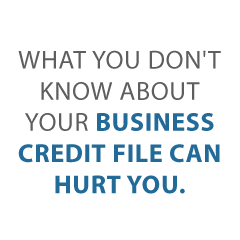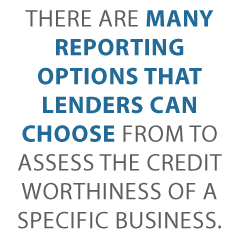What you don’t know about your business credit file can hurt you. You see, your business credit file is to your company as your personal credit file is to you as an individual. It details your credit history. In addition, it makes predictions about your ability to repay debts both now and into the future. These predictions are based upon not only your credit history, but also company finances and data received from other sources, such as public records. Lenders use it to help determine whether or not to lend to your business.
Your Business Credit File Affects Your Fundability, and That’s a Big Deal
The thing is, your business credit file isn’t the only thing they use. It is simply a piece of a bigger puzzle known as fundability. When lenders look at your credit file, they are looking at it with fundability in mind. What is fundability? It is, overall, how your business looks to lenders in regards to return on investment.
Check out our best webinar with its trustworthy list of seven vendors to help you build business credit.
Lenders are in it for the profits. If you do not pay back the debt, they do not make money. Therefore, they only approve loans to those businesses that appear to be fundable. These are business that have all their ducks in a row. All licensees are in place. Contact and ownership information is complete, dedicated, and verifiable. There is a business bank account, and bills are being paid. All of this and more, including your business credit file, come together to create a complete fundability picture. Find out more about fundability and how to become fundable here.
How to Start a Business Credit File
Unlike your personal credit file, your business credit file is not something that occurs passively. For it to be complete and correct, you have to take action. This looks different depending on the business credit reporting agency (CRA.) Some of them do automatically open a file once a business starts opening accounts and those accounts start reporting. However, if that business is not set up properly to build business credit, the information will be all tangled up with personal information and will not accurately reflect the creditworthiness of the business itself.
Other CRAs requires you to manually take action to open an account specifically with them. For example, with Dun & Bradstreet you have to get a D-U-N-S number.
Other than that, the main thing to do is get accounts reporting to the business CRAs. There are several, but the most commonly used are Dun & Bradstreet, Experian, and Equifax. The key is to open business accounts that will report your payments to these agencies. With some, you can also self-report accounts to get your credit rolling, but that isn’t always the best idea.
Self-reporting
Dun & Bradstreet and Equifax each allow you to self-report your payments on accounts. If you are already in business with vendors that will not report payments, and you cannot make a change, this may be an option.
Don’t forget you have to have a D-U-N-S number before you start reporting to D&B. If you don’t have that number already, accounts reported will not matter. Also, it costs money to self-report.
Additionally, they will try to sell you other products in the process. If these products will be useful to you, feel free to consider them. Just know that they are not necessary to open your business credit file. In fact, many of the products and services you will be offered are provided for free by other companies.
If you choose to self-report with Equifax, you will have to meet certain minimum requirements. For financial businesses, this means you must have a minimum of 500 vendors to report, and all other businesses must have a minimum of 2,000 vendors.
Experian does not allow self-reporting, but rather relies on verified information from third-parties. In fact, if you are currently running a business, you probably already have a business credit file with Experian.
While it is allowed, self-reporting can be costly. Not only that, but it doesn’t always result in a score increase. Accounts will report to your business credit file for free anyway if you handle things properly.
It is better to ensure your good credit practices are reported to all three credit agencies by verified third parties rather than self-reporting. How does this happen?
Check with Current Vendors
If you have any current vendor relationships, find out if they report your payments to the credit agencies. If they do not, ask them to do so. They don’t have too, but if they won’t, see about finding other vendors that will. While it isn’t always possible to switch vendors, it is worth it to try.
For future vendors, ask the question before you begin a business relationship. This will help establish a business credit file from the beginning.
Work with Vendors in the Vendor Credit Tier
The credit tiers are a new concept for many business owners. Here is how it works. You start by opening accounts with vendors, often called starter vendors, in the vendor credit tier. These are vendors that will extend net 30 terms without a credit check, and then report your payments to the business credit reporting agencies.
After you get enough of these reporting, you can apply for credit cards in the retail credit tier, the fleet credit tier, and the cash credit tier, in that order. Find out more about starter vendors and the process of working through the credit tiers here.
Check out our best webinar with its trustworthy list of seven vendors to help you build business credit.
Get a Business Credit Card
Virtually all credit card companies report to the credit agencies. Use your business name and contact information and apply for a business credit card. You may have to make do with a lower credit limit and higher interest rate early on if you do not yet have a business credit score. However, once you build your credit file a bit, you can ask for an increase in limit or apply for a card with more favorable terms.
Remember to look for cards with other perks as well. A few examples of business credit cards and the perks they offer include:
-
- Capital One Spark Cash for Business– unlimited 2% cash back on all purchases, which can add up to a lot over the course of a year. In addition, you get a 0% introductory APR and, if you spend $4,500 in the first 3 months, you qualify for a $500 cash sign up bonus.
- Chase Ink Business Unlimited- unlimited 1.5% cash back on all purchases, and you can earn a $500 cash bonus here too. There is no annual fee, and you get 0% on balance transfers and purchases for 12 months.
- Ink Business Cash Credit Card- 0% APR for 12 months and 5% cash back on purchases made in certain business categories, as well as a $500 sign up bonus.
Be aware that you probably will not qualify for these immediately if your business credit file is new or incomplete. Once you get the ball rolling and have a strong business credit score however, these should be accessible.
Ask Utilities to Report Payments
Most utilities do not report payments to credit agencies. Furthermore, they don’t have to. However, some of them will report if you ask. The worst they can say is no. Then, if they say yes and you pay on time, it can only help you.
Consider Taking Out a Private Business Loan
Some private lenders will offer business loans with a low credit score and report payments to business credit reporting agencies. Here are a few to consider.
BlueVine
Many private lenders offer options more similar to invoice factoring and lines of credit. Why? These types of products present less risk than straight term loans.
The minimum loan amount available from BlueVine is $5,000 and the maximum is $100,000. Annual revenue must be $120,000 or more, and the borrower must be in business for at least 6 months. Personal credit score has to be 600 or above. Also, BlueVine does not offer a line of credit in all states. You can find out more in our review here.
They report to Experian. They are one of the few invoice factoring companies that will report to the business credit bureaus.
Fundation
Fundation offers a fast automated process. Originally, they only offered invoice financing. Later, they included the line of credit service. Repayments are automatic. They draft them electronically on a weekly basis. One thing to remember is that repayment could be as high as 5 to 7% of the amount you have drawn currently. This is because the repayment period is relatively short.
You can get loans for as little as $100 and as high as up to $100,000, but the max initial draw is $50,000. They do have some products that go up to $500,000. Though there is no minimum credit score requirement, they do require at least 3 months in business, $50,000 or more in annual revenue, and a business checking account with a minimum balance of $500.
Fundation reports to Dun & Bradstreet, Equifax SBFE, PayNet, and Experian. As a result, they are a great option if you are looking to build a healthy credit file.
The Business Backer
These guys offer a product they call FlexFund Line of Credit. Funds vary in amounts from $5,000 to $240,000. Draws can be repaid on either a weekly or daily basis.
They report to Dun & Bradstreet and Equifax.
OnDeck
With OnDeck, applying for financing is quick and easy. Apply online, and you will receive your decision once application processing is final. Loan funds will go straight to your bank account. The minimum loan amount is $5,000 and the maximum is $500,000.
There is a personal credit score requirement of 600 or more. Also, you must be in business for at least one year. There is an annual revenue requirement of at least $100,000 as well. In addition, there can’t be a bankruptcy on file in the past 2 years. No unresolved liens or judgements are allowed either.
OnDeck reports to the standard business credit bureaus.
Check out our best webinar with its trustworthy list of seven vendors to help you build business credit.
Credit Monitoring
You know what your business credit file is and how to start it. You have a toolbox full of tips to help make it stronger. Still, you have no clue what yours actually says. How can you find out what is on your credit file? Furthermore, how can you correct any mistakes on your file? That is where credit monitoring comes into play.
Monitoring your business credit file can help you get an idea of how it is affecting the fundability of your business. Unfortunately, you cannot get a free copy of your business credit reports like you can with your personal credit reports. It costs money to monitor your business credit as a general rule.
For example, the big three charge close to $50 or more for each report:
- Dun & Bradstreet reports range in price from $61 to $229 per report.
- Experian reports are $49.95 per report.
- Equifax is $99.95 per report.
However, you can monitor your credit with D&B and Experian at a fraction of these costs by going to https://www.creditsuite.com/monitoring/.
What to Do If You Find a Mistake on Your Credit File
First, if you find any inaccuracies in contact information, simply update it. You will need to do so in writing. Next, look over reporting accounts. If you see any accounts that are not yours, you will also need to contact the company in writing. It is likely the mistake is due to another business having a similar name, so you may have to do some research and send in copies of your incorporation documents. You may also have to contact the company that is reporting the account.
If you find accounts reporting late or missed payments that you know are incorrect, notify the CRA of the mistake in writing. Send copies of supporting documentation showing that the payments were made and when they were made.
Monitoring your business credit file is vital to keeping it complete, accurate, and healthy.
Your Business Credit File Affects Fundability: It’s Important!
Your business credit file is only one part of the much bigger fundability picture. However, it is a hugely important part. In fact, without it, the whole picture is pretty much ruined. For your business to be fundable, your business credit has to be in order.
This means ensuring your business is set up as an entity separate from yourself, and making sure all your information is consistent across all channels.
The post What is Your Business Credit File and Why Does it Matter appeared first on Credit Suite.






